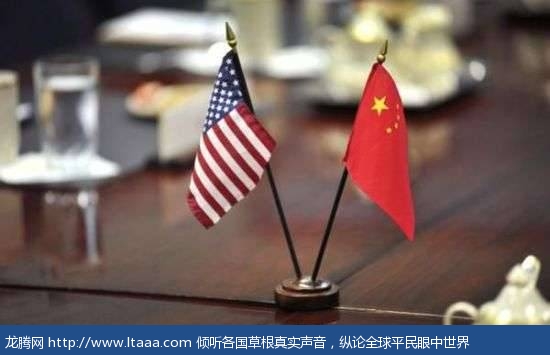美国:中国绝成不了一个全球玩家 [美国媒体]
在与中国打交道时,美国领导人犯了一个重大战略错误,即,他们把中国看做是一个全球玩家,而没把它当做一个地区玩家。地区玩家才是中国的真实地位。
America Should Treat China As ARegional, Not A Global Player
美国不应当把中国看做是一个全球玩家,而应当把它看做是一个地区玩家。
6/11/2016 @ 2:20下午
In dealing with China, Americanleaders are making a big strategic mistake: they are treating China as a globalrather than a regional player. That’s what China really is.
在与中国打交道时,美国领导人犯了一个重大战略错误,即,他们把中国看做是一个全球玩家,而没把它当做一个地区玩家。地区玩家才是中国的真实地位。
China has been making a great dealof noise lately. Over the South China Sea, that is, building artificialislands, urging US to stay away from the region, enlisting a couple of Africancountries on its side, even going so far as to say that it doesn’t fear troublein the region.
近年来中国做了不少小动作。在中国南海建人工岛,要求美国远离该地区,拉非洲几个小国选边站,即使到现在来看,它在这块地方好像一点都不怕事大。
Still Washington has been very nice to China —too nice some would think — keeping American markets wide open to Chineseproducts, and holding annual bilateral summits on the global economy — like theone held in Beijing this week.
有些人认为,华盛顿一直对中国——太好了,比如向中国开放市场,每年都举行全球经济双边峰会,就在上(本)周还举行了一次。
To be fair, I am not suggesting thatWashington shouldn’t talk to China on global issues. But it should do so withinmultilateral rather than bilateral forums (e.g., WTO and UN).Bilateral forumsupgrade China from a regional player to a global player, and give Beijing thefalse impression that China is turning into a superpower.
公平地说,我没在是华盛顿不应该和中国讨论全球问题。可它应该在多边范围内,而非双边范畴来讨论这些问题(类似WTO问题,联合国问题也应当如此)。双边论坛把中国从一个区域玩家抬升到了一个全球玩家的层次,这给北京留下了一个假象,即,中国正朝着一个超级大国转变。
That’s a dangerous precedent for thefuture of globalization in the Asia-Pacificregion.
对亚太地区的未来,这开了一个危险的先例。
True, China is the world’s secondlargest economy soon closing in on the US economy, but so was Japan back in the1980s. Where’s Japan now? Floundering in the swamp of stagnation, counting theone lost decade after the other.
诚然,中国是世界上第二大经济体,而且很快就会赶上美国,但这又如何,日本在八十年代不也缩回去了。现在日本在哪?经历一个又一个过丢失的十年,还在泥潭中停滞挣扎呢。
To be fair, Japan is a special case,as a host of problems crippled its growth… from the bursting of multiple assetbubbles to negative demographics. Besides, Japan’s military is still controlledby the US, which wrote the country’s constitution back during the Occupation.
坦白地说,日本是个特例,由于一大堆问题——从大量资产泡沫破裂到人口问题,严重拖累了它的经济。另外,日本军队仍受美国所控制,这在占领时期就写进了日本宪法。
But even if it is assumed that Chinadoesn’t share the fate of Japan, and its economy continue to grow to eventuallybypass that of the US in size, it won’t match America’s military might.
假设中国不会遭受日本那样的命运,其经济继续增长甚至超越美国,即便如此,其军事力量还是无法对抗美国。
For a reason: fast economic growthdoesn’t lead to military supremacy these days, unless it is supported andreinforced by technological supremacy.
(这说明)一个理由:经济快速增长是无法成为军事霸权,除非是受到援助或是占尽技术优势。
That’s not the case with China. Infact, China lags badly behind the US, as is nicely argued by Stephen G. Brooksand William C. Wohlforth in “The Once and Future Superpower: Why China Won’tOvertake the United States,” published in Foreign Affairs (May/June 2016issue).
但这都不是中国所具有的。事实上,中国离我们还差得很远。史蒂芬G.布鲁克斯和威廉C.沃尔福斯”在2016年5/6月的《外交事务》提出了一个非常不错的观点,“曾经的和未来的超级大国:为什么中国无法超越美国”。
“Economic growth no longertranslates as directly into military power as it did in the past, which meansthat it is now harder than ever for rising powers to rise, and established onesto fall. And China — the only country with the raw potential to become a trueglobal peer of the United States — also faces a more daunting challenge thanprevious rising states because of how far it lags behind technologically.”
“经济增长不再会像过去那样直接转化为军事力量,也就是说,现在,大国崛起和守成大国的衰落都比以前要难的多,而中国,唯一一个有潜力与美国并肩称雄的国家,但由于科技技术远为落后,这会比以前那些新兴国家面临着更为艰巨的挑战“。
China’s technological gap vis-à-visthe US is the country’s Achilles heel, according to the authors.
相对于美国,科技差距是中国的一大短板。作者写道。
“China’s true Achilles heel on theworld stage is something else: its low level of technological expertisecompared to the United States’. Relative to past rising powers, China has amuch wider technological gap to close with the leading power.”
在世界舞台上,中国真正的致命缺陷是其他某些东西。“同美国相比,中国的科技水平很低。相对于以前一些崛起中的大国,中国科技远赶不上其领导力”。
Much more than that of Japan back in the 1980s. That’s why China’s role will beconfined to that of a regional payer within the Asian-Pacific region ratherthan a global player. “China’s relative technological backwardness today,however, means that even if its economy continues to gain ground, it won’t beeasy for it to catch up militarily and become a true global strategic peer, as opposed to a merely amajor player in its own neighborhood.”
即使比起80年代衰落的日本还要更甚。这就是为什么中国也就只能局限于亚太一个地区角色,而成不了一个全球玩家的原因。 “无论怎样,中国科技的相对落后,意味着它即使在经济上能继续保持进步,但也很难缩小军事(差距)成为一个真正的全球战略同行,它反而纯粹就是街里邻坊一个主要玩家而已。”
Simply put, China doesn’t have whatit takes to be a military superpower.
简而言之,中国无法成为一个军事超级大国。
版权声明
我们致力于传递世界各地老百姓最真实、最直接、最详尽的对中国的看法
【版权与免责声明】如发现内容存在版权问题,烦请提供相关信息发邮件,
我们将及时沟通与处理。本站内容除非来源注明五毛网,否则均为网友转载,涉及言论、版权与本站无关。
本文仅代表作者观点,不代表本站立场。
本文来自网络,如有侵权及时联系本网站。
图文文章RECOMMEND
热门文章HOT NEWS
-
1
Why do most people who have a positive view of China have been to ...
- 2
- 3
- 4
- 5
- 6
- 7
- 8
- 9
- 10
推荐文章HOT NEWS
-
1
Why do most people who have a positive view of China have been to ...
- 2
- 3
- 4
- 5
- 6
- 7
- 8
- 9
- 10











